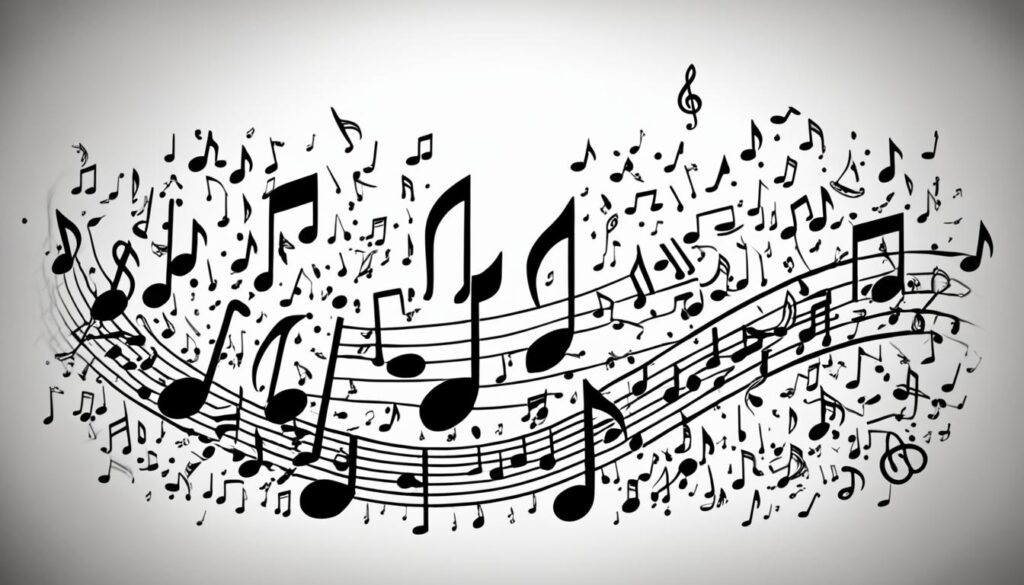Have you ever experienced that one song that instantly transports you to a different world? The lyrics, the melody, and most importantly, the rhythm seem to grip your soul, unraveling an emotional journey like no other. For me, music has always held a special place in my heart, serving as a refuge in times of stress and turmoil. It's fascinating how a simple rhythm can resonate so deeply within us, stirring emotions and offering solace.
Today, I want to share with you the incredible role that rhythm plays in music therapy for anxiety relief. It's an area of study that merges the worlds of science and art, harnessing the therapeutic benefits of music to support our mental health. Through rhythmic entrainment and the neuroscience of music therapy, we can tap into the healing power of music and find relaxation amidst the chaos.
Our Top Pick For Beating Panic Attacks

Stopping, and preventing, panic attacks is now even easier.
Key Takeaways:
- Music therapy utilizes the power of rhythm to promote anxiety relief and enhance emotional well-being.
- Rhythmic entrainment in music therapy synchronizes brainwaves and induces a state of relaxation.
- Music has been scientifically proven to reduce stress, release neurotransmitters, and improve mood.
- Techniques such as Guided Imagery and Music, drumming therapy, and music-assisted progressive muscle relaxation offer effective ways to achieve stress reduction.
- Music therapy has a rich history and continues to evolve as a recognized profession with therapeutic benefits for individuals of all ages.
The Science Behind Music Therapy
Music has a profound impact on the brain, directly influencing emotions and mood. When we listen to music, our brain releases neurotransmitters like dopamine and serotonin, which play a crucial role in regulating our emotions and improving our overall well-being. These neurotransmitters are often referred to as “feel-good” chemicals, as they contribute to a sense of pleasure, happiness, and relaxation.
Music therapy harnesses the power of music to promote relaxation, reduce anxiety, and enhance emotional well-being. Through carefully curated playlists and therapeutic interventions, music therapists work with individuals to create a personalized experience that addresses their unique emotional needs. By tapping into the brain's response to music, music therapy has been shown to have a direct impact on our mental and emotional state.
One of the key ways that music therapy achieves these benefits is by reducing the production of cortisol, the stress hormone. When we experience stress, cortisol levels rise, leading to physical and mental tension. Music therapy helps to lower blood pressure, slow down the heart rate, and induce a state of deep relaxation, allowing our bodies to release built-up stress and promote a sense of calm.
Neurotransmitters:
| Neurotransmitter | Impact on Brain and Emotions |
|---|---|
| Dopamine | Improves mood and motivation |
| Serotonin | Enhances mood, reduces anxiety, and promotes emotional well-being |
In addition to its effect on neurotransmitters, music therapy also activates various areas of the brain involved in emotion processing. Research has shown that specific musical elements, such as rhythm and melody, stimulate different parts of the brain, leading to emotional responses and mood regulation. By strategically utilizing these musical elements, music therapy can help individuals shift their emotional state, providing a powerful tool for emotional healing.
By understanding the science behind music therapy and its impact on the brain, we can unlock the potential of music to promote relaxation, reduce anxiety, and support emotional well-being. Incorporating music therapy into our lives can have a transformative effect on our mental and emotional health, allowing us to tap into the therapeutic benefits that music has to offer.
Music Therapy Techniques for Stress Relief
When it comes to stress relief and emotional healing, music therapy offers a range of effective techniques that harness the power of music. These techniques provide personalized approaches to help individuals achieve deep relaxation and emotional well-being. Let's explore some of these techniques:
1. Guided Imagery and Music
Guided Imagery and Music (GIM) is a music therapy technique that combines relaxation processes with carefully selected music. During GIM sessions, individuals are guided to explore their emotions beyond conscious awareness. The calming and soothing nature of the music helps individuals tap into their emotional experiences, allowing for deeper introspection and healing.
2. Drumming Therapy
Drumming therapy utilizes the rhythmic qualities of music and drumming to reduce stress and release emotions. The repetitive beats and rhythmic patterns have been found to synchronize brainwaves, promoting a sense of calm and focus. Drumming therapy can be done individually or in a group, offering individuals a creative and expressive outlet to relieve stress and connect with their emotions.
3. Music-Assisted Progressive Muscle Relaxation
Music-Assisted Progressive Muscle Relaxation combines music with muscle relaxation exercises to alleviate physical tension and induce deep relaxation. Individuals are guided to sequentially tense and release different muscle groups while listening to calming music. The harmonious combination of music and muscle relaxation techniques helps individuals release physical tension, promote relaxation, and reduce stress levels.
By incorporating these music therapy techniques into daily routines, individuals can experience the therapeutic benefits of music and achieve stress reduction and emotional healing.

| Technique | Benefits |
|---|---|
| Guided Imagery and Music | • Explores emotions beyond conscious awareness • Promotes deep introspection and healing |
| Drumming Therapy | • Reduces stress and releases emotions • Synchronizes brainwaves for focus and calmness |
| Music-Assisted Progressive Muscle Relaxation | • Alleviates physical tension • Induces deep relaxation and reduces stress levels |
Case Studies and Statistics
Music therapy studies have consistently demonstrated its effectiveness in reducing stress and promoting emotional healing. Research has shown that music therapy can significantly lower anxiety levels in patients undergoing surgery, providing a calming and soothing effect during a potentially stressful experience.
“Music therapy significantly reduced anxiety levels in patients undergoing surgery.”
In addition to stress reduction, music therapy has also been found to have positive effects on depressive symptoms and overall well-being. Mothers experiencing postpartum depression have benefited from music therapy, which not only reduced depressive symptoms but also enhanced their emotional well-being and sense of connection.
“Music therapy reduced depressive symptoms and enhanced overall well-being in mothers experiencing postpartum depression.”
Surveys indicate that the majority of adults use music as a means of managing stress. Listening to calming music has been shown to reduce stress hormone levels, promoting relaxation and a sense of peace.
Music therapy studies have consistently shown:
- Reduction in anxiety levels during surgery
- Improvement in emotional well-being in mothers with postpartum depression
- Calming effects for stress reduction and relaxation
These findings demonstrate the significant therapeutic benefits of music therapy in addressing stress, anxiety, and depressive symptoms. Through its ability to promote relaxation and emotional healing, music therapy offers a powerful and accessible tool for improving overall well-being.
The Transformative Power of Music Therapy Enhancing Relaxation and Emotional Healing
Music therapy has the incredible ability to transform and enhance relaxation, as well as facilitate emotional healing. By harnessing the healing power of music, this therapeutic practice addresses physical, emotional, cognitive, and social needs. Through music therapy, individuals are provided with a safe and non-threatening outlet to express and process complex emotions. This promotes not only stress reduction but also emotional well-being and a sense of calm.
Research has shown that music therapy offers a range of therapeutic benefits. It has been found to improve cognitive functions, reduce pain perception, and enhance social connection. Listening to carefully selected music or engaging in music-making activities can have a profound impact on one's well-being. It can evoke positive emotions, stimulate the release of neurotransmitters, and create a soothing and relaxing environment.
“Music is a moral law. It gives soul to the universe, wings to the mind, flight to the imagination, and charm and gaiety to life and to everything.” – Plato
Music therapy interventions can take many forms, including listening to music, creating music, singing, and using musical instruments. These activities can promote emotional expression, improve communication, enhance motor skills, and help individuals manage stress. The therapeutic relationship between the music therapist and the client plays a crucial role in achieving these outcomes.
The transformative power of music therapy extends beyond the individual. It can also foster a sense of connection and community. Group music therapy sessions allow individuals to share their experiences, support one another, and build social bonds. Music has a unique way of bringing people together and creating a shared sense of harmony and understanding.

The History of Music Therapy
Music therapy has a long and rich history that can be traced back to ancient civilizations, such as Egypt, Greece, and China. In these cultures, music was believed to possess healing properties and was used for various therapeutic purposes.
During the 20th century, music therapy began to emerge as a formal practice, thanks to the contributions of pioneers like Eva Augusta Vescelius and Alvin McLean. They recognized the power of music in promoting healing, relaxation, and emotional well-being.
One significant milestone in the development of music therapy was during World War II. Music therapy gained recognition for its role in rehabilitating soldiers who were suffering from physical and emotional trauma. The soothing and uplifting qualities of music were found to support their rehabilitation process and improve their overall well-being.
Over the years, music therapy has evolved into a profession endorsed by healthcare and mental health organizations. It has become an integral part of rehabilitation programs, hospitals, schools, and various therapeutic settings.
Understanding Music Therapy
Music therapy is an evidence-based practice that utilizes music interventions to address individualized goals within a therapeutic relationship. As a music therapist, I assess my clients' emotional, cognitive, and physical needs to tailor interventions that promote relaxation, enhance communication, improve motor skills, manage stress, and facilitate emotional expression.
- Listening to music
- Creating music
- Singing
- Using musical instruments
I believe that music has the power to deeply impact our well-being, and through music therapy, I aim to harness this power to support my clients in their journey towards emotional and cognitive healing. By strategically utilizing music interventions, I can create a safe and therapeutic space that allows individuals to explore and process their thoughts, emotions, and experiences.
“Music therapy provides a unique opportunity for individuals to connect with themselves and others on a profound level. Through the therapeutic relationship, I can guide and support my clients in their emotional journey, fostering growth, resilience, and well-being.”

In music therapy, I am constantly fascinated by the transformative impact that music can have on individuals. It has been proven to address emotional, cognitive, and physical needs, making it a versatile and holistic approach to therapy. By incorporating evidence-based practices and utilizing the power of music, I strive to create a therapeutic experience that promotes healing and enhances overall well-being.
Benefits of Music Therapy
Music therapy offers a wide range of benefits for individuals of all ages and backgrounds. By harnessing the power of music, this therapeutic practice provides a safe and non-threatening outlet for emotional expression, helping individuals cope with various challenges and enhance their overall well-being. Let's explore the numerous benefits that music therapy can bring:
Emotional Expression and Stress Reduction
Music therapy allows individuals to express and process complex emotions in a supportive and non-judgmental environment. Engaging in musical activities, such as playing instruments or singing, provides a means of emotional release and catharsis. The ability to express oneself through music can reduce stress and promote a sense of relief and relaxation.
Cognitive Enhancement and Pain Management
Research has shown that music therapy can enhance cognitive functions such as attention, memory, and problem-solving skills. By engaging in musical activities, individuals can stimulate their brains and improve cognitive abilities. Moreover, music therapy has been found to help manage pain by diverting attention and promoting relaxation.
Social Connection and Motor Skill Improvement
Music therapy promotes social interaction and connection. Participating in group music sessions or joining a choir provides opportunities for individuals to connect with others, build relationships, and feel a sense of belonging. Additionally, playing musical instruments and engaging in rhythmic movements can improve motor skills and coordination.
Overall, music therapy offers a holistic approach to well-being by addressing emotional, cognitive, and physical needs. Whether it's through emotional expression, stress reduction, cognitive enhancement, pain management, social connection, or motor skill improvement, music therapy has the power to transform lives and promote positive change.
With music therapy, individuals can experience the healing and transformative effects of music, leading to improved emotional well-being and a greater sense of harmony in their lives.
Applications of Music Therapy
Music therapy encompasses a wide range of applications in various healthcare and educational settings. By harnessing the power of music, it provides valuable therapeutic interventions for individuals of all ages and diverse backgrounds. Let's explore some of the key applications of music therapy:
Mental Health
Music therapy is highly effective in addressing mental health issues such as anxiety and depression. Through carefully curated musical experiences and interventions, it helps individuals manage their emotions, reduce stress, and improve overall well-being. Music has the unique ability to evoke powerful emotions and create a sense of comfort, providing a therapeutic outlet for emotional expression.
Autism Spectrum Disorder
For individuals on the autism spectrum, music therapy offers a powerful tool for improving social interaction and communication skills. By incorporating music into structured sessions, music therapists create a supportive environment that promotes engagement, self-expression, and connection. The rhythmic patterns and repetitive nature of music have been found to enhance cognitive and sensory processing in individuals with autism spectrum disorder.
Dementia
Music therapy holds significant potential in stimulating memories and emotions in individuals with dementia. The familiar melodies and lyrics of songs from their past can evoke deep emotional responses, providing a sense of comfort and connection. Music therapy interventions help in improving mood, reducing agitation, and enhancing overall quality of life for individuals living with dementia.
Stroke Rehabilitation
With its rhythmic and melodic nature, music therapy plays a valuable role in stroke rehabilitation. The structured exercises and repetitive patterns of music assist in regaining motor skills, promoting movement and coordination. Through carefully designed interventions, music therapists help individuals relearn movements, improve speech and language, and enhance their overall physical and cognitive functioning.
Education
Music therapy brings numerous benefits to educational settings by enhancing learning and social skills. Incorporating music into the classroom environment helps facilitate engagement, improve attention, and promote creativity. Music therapy interventions can support students with special needs, providing a safe and inclusive space for self-expression, emotional regulation, and academic development.
“Music therapy allows individuals to express themselves, connect with others, and achieve personal growth through the power of music.” – Music Therapist
| Application | Benefits |
|---|---|
| Mental Health | Reduced anxiety and stress, improved emotional well-being |
| Autism Spectrum Disorder | Enhanced social interaction and communication skills |
| Dementia | Stimulated memories and emotions, reduced agitation |
| Stroke Rehabilitation | Improved motor skills, speech and language recovery |
| Education | Enhanced learning, improved attention and social skills |
Through its diverse applications, music therapy has the power to transform lives, fostering healing and growth across various healthcare and educational settings. Its unique ability to tap into the emotional and cognitive domains through the universal language of music makes it a valuable tool for promoting well-being and improving quality of life.

The Future of Music Therapy
Music therapy is continuously evolving and gaining recognition for its unique ability to alleviate stress, support emotional healing, and improve overall well-being. As advancements in technology continue to reshape various industries, music therapy is no exception. The future of music therapy holds immense potential, with the integration of technology paving the way for its expansion into mainstream healthcare and enhancing its accessibility.
Creating a balance between technology and the holistic approach of music therapy, mobile applications and streaming services are making therapeutic music more accessible to a wider population. These platforms offer curated playlists and guided sessions tailored to specific needs, enabling individuals to harness the transformative power of music from the comfort of their own homes.

With the integration of technology, music therapy can reach individuals who may not have had easy access to traditional therapy settings due to geographical constraints or physical limitations. The utilization of virtual platforms enables music therapists to connect with clients remotely, breaking barriers and increasing the reach of therapeutic interventions.
Furthermore, technology opens up possibilities for personalized music therapy experiences. Through data-driven analytics and machine learning algorithms, music therapy applications can analyze individual responses to different music stimuli, tailoring interventions to address specific emotional and cognitive needs. This personalized approach enhances the effectiveness of music therapy by providing individualized experiences that resonate with each person's unique journey towards healing.
Future Applications of Music Therapy
The future of music therapy extends beyond individual sessions. With its growing recognition, it has the potential to become an integral part of stress management programs in mainstream healthcare. By incorporating music therapy into the broader healthcare system, it can enhance the holistic approach to well-being and complement conventional medical treatments.
Moreover, the future of music therapy holds immense potential in various fields, including mental health, autism spectrum disorder, dementia care, stroke rehabilitation, and education. By leveraging the therapeutic benefits of music, it can play a vital role in improving mental health outcomes, facilitating communication and social interaction, stimulating memories and emotions, aiding in motor skill recovery, and enhancing learning experiences.
Music therapy, when combined with technology and integrated into mainstream healthcare, has the power to revolutionize the way we approach wellness. It embraces the holistic nature of human well-being, recognizing that emotional, physical, and cognitive aspects are interconnected. Through its transformative potential, music therapy has the capacity to empower individuals, support healing, and create a future where everyone has access to the therapeutic benefits of music.
| Benefits of the Future of Music Therapy | Implications |
|---|---|
| Improved accessibility | Greater reach to underserved populations |
| Personalized interventions | Enhanced therapeutic effectiveness |
| Integration into mainstream healthcare | Comprehensive approach to well-being |
| Multidisciplinary applications | Improved outcomes in diverse fields |
The future of music therapy is a promising landscape, with technology serving as a catalyst for progress. By embracing this fusion of music and digital innovation, we can unlock the full potential of music therapy, making it an integral part of mainstream healthcare and empowering individuals on their journey towards relaxation, emotional healing, and total well-being.
Conclusion
Music therapy, with its emphasis on rhythm, plays a significant role in anxiety relief and improving mental health. By utilizing the profound impact of music on the brain and emotions, music therapy offers non-invasive and personalized approaches to stress reduction and emotional healing. Various techniques, supported by research and case studies, have shown significant benefits in reducing anxiety levels, relieving depressive symptoms, promoting relaxation, and enhancing overall well-being.
As the field of music therapy continues to evolve, its potential to improve the lives of individuals experiencing anxiety and related conditions remains promising. The therapeutic power of music, combined with the expertise of trained music therapists, provides a holistic and effective means of addressing mental health challenges. Whether it's through guided imagery and music, drumming therapy, or music-assisted progressive muscle relaxation, music therapy offers individuals a unique pathway to find relief and reconnect with their emotional well-being.
By incorporating music therapy into mainstream healthcare practices, we can broaden the accessibility of this powerful therapeutic modality. Its non-invasive nature, individualized approach, and universal appeal make music therapy a valuable tool in stress reduction, anxiety relief, and mental health support. As we continue to explore the transformative potential of music therapy, we open up new avenues for enhancing emotional well-being, promoting self-expression, and fostering a deeper connection with ourselves and others.
FAQ
How does music therapy help in relieving anxiety?
Music therapy utilizes the profound impact of music on the brain to promote relaxation, reduce anxiety, and enhance emotional well-being. Music has been found to release neurotransmitters like dopamine and serotonin, which improve mood and decrease stress levels. By reducing the production of cortisol, the stress hormone, music therapy helps to lower blood pressure, slow down the heart rate, and induce deep relaxation.
What are some music therapy techniques for stress relief?
Music therapy employs various techniques for stress relief and emotional healing. Guided Imagery and Music involves relaxation processes accompanied by carefully selected music to explore emotions beyond conscious awareness. Drumming therapy utilizes the rhythmic qualities of music and drumming to reduce stress and release emotions. Music-Assisted Progressive Muscle Relaxation combines music with muscle relaxation exercises to alleviate physical tension and induce deep relaxation.
What do studies say about the effectiveness of music therapy?
Studies have shown the efficacy of music therapy in relieving stress and supporting emotional healing. For example, a study showed that music therapy significantly reduced anxiety levels in patients undergoing surgery. Another study found that music therapy reduced depressive symptoms and enhanced overall well-being in mothers experiencing postpartum depression. Surveys have also indicated that a majority of adults use music to manage stress. Listening to calming music has been shown to reduce stress hormone levels and promote relaxation.
What are the benefits of music therapy?
Music therapy offers a transformative power in enhancing relaxation and facilitating emotional healing. It harnesses the healing power of music to address physical, emotional, cognitive, and social needs. By providing a safe and non-threatening outlet for emotional expression, music therapy allows individuals to process and communicate complex feelings. It promotes stress reduction, emotional well-being, and a sense of calm. Additionally, music therapy has been found to improve cognitive functions, reduce pain perception, and enhance social connection.
Where does music therapy find applications?
Music therapy finds applications in various healthcare and educational settings. It is used to address mental health issues such as anxiety and depression, improve social interaction and communication in individuals with autism spectrum disorder, stimulate memories and emotions in individuals with dementia, aid in stroke rehabilitation through rhythm and melody, and enhance learning and social skills in educational settings.
How has music therapy evolved over time?
Music therapy has a long history, dating back to ancient civilizations such as Egypt, Greece, and China, where music was believed to possess healing properties. In the 20th century, music therapy began to take shape as a formal practice, with pioneers like Eva Augusta Vescelius and Alvin McLean contributing to its development. During World War II, music therapy gained recognition for its role in rehabilitating soldiers suffering from physical and emotional trauma. Over the years, the field has evolved, establishing itself as a profession endorsed by healthcare and mental health organizations.
What is the future of music therapy?
Music therapy continues to evolve and gain recognition for its unique ability to alleviate stress, support emotional healing, and improve overall well-being. Advancements in technology, such as mobile applications and streaming services, are making music therapy more accessible to a wider population. These platforms provide curated playlists and guided sessions tailored to specific needs, allowing individuals to harness the therapeutic benefits of music. The future of music therapy holds the potential for it to become a mainstream healthcare practice and an integral part of stress management programs, offering a holistic approach to well-being.



